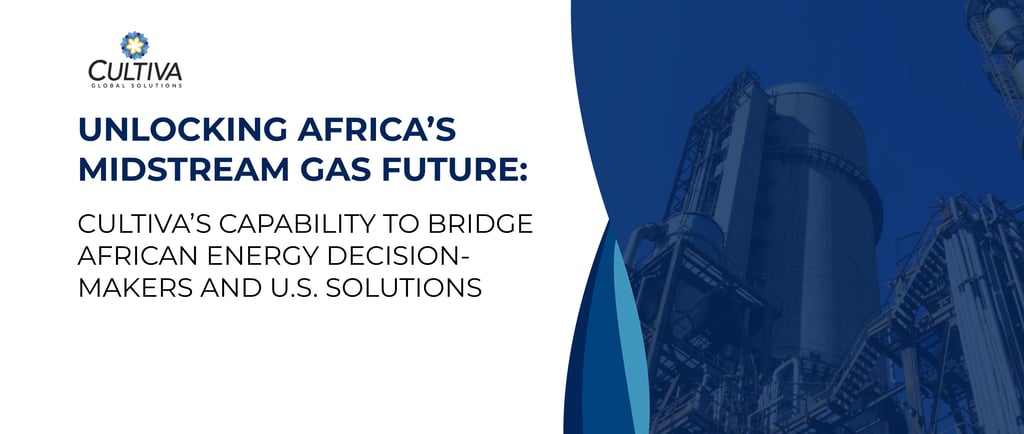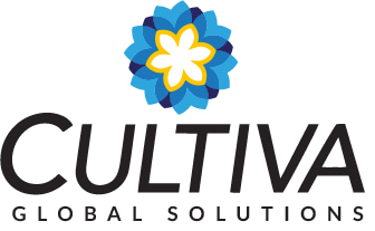Unlocking Africa’s Midstream Gas Future: CULTIVA’s Capability to Bridge African Stakeholders and U.S. Solutions
Across Sub-Saharan Africa, the momentum behind natural gas development is undeniable. From Nigeria’s Atlantic pipeline vision to Senegal’s new gas networks and Mozambique’s LNG projects, governments are advancing ambitious infrastructure programs designed to unlock reserves, lower energy costs, and expand regional trade. These initiatives require not only investment and technology but also structured partnerships with international partners who bring proven expertise in midstream gas infrastructure.
9/23/20252 min read


Unlocking Africa’s Midstream Gas Future: CULTIVA’s Capability to Bridge Regional Markets and U.S. Solutions
Across Sub-Saharan markets, momentum behind natural gas development continues to accelerate. From emerging pipeline corridors to LNG terminal expansion and processing facilities, governments are pursuing infrastructure programs designed to unlock reserves, lower energy costs, and strengthen regional trade. These efforts require not only investment and technology but also structured collaboration with international partners who bring technical expertise and implementation experience.
Understanding the Opportunity
The midstream sector is at a pivotal stage of growth. Countries across the region are working to:
Construct new pipelines connecting reserves with industrial and export hubs.
Expand LNG import and export terminals to balance domestic demand with trade opportunities.
Develop processing facilities that convert raw reserves into market-ready energy.
Enhance regional infrastructure linking economies and supporting integration.
Each of these priorities calls for sound engineering, project finance, regulatory insight, and commercial engagement. The complexity of these initiatives makes partnerships with U.S. companies particularly valuable — combining proven technology, financial discipline, and technical precision.
The opportunity now lies in creating structured platforms where decision-makers and industry leaders can exchange knowledge and establish practical, results-driven connections.
CULTIVA’s Capabilities
For more than a decade, CULTIVA has designed and delivered international programs that strengthen commercial engagement between U.S. firms and global markets.
Trade and Delegation Management
Successfully executing trade missions and international exchanges that connect policymakers, utilities, and private developers with U.S. companies.
Sector Expertise
Partnering with technical specialists in midstream gas infrastructure who bring extensive experience in Sub-Saharan markets and U.S. industry practices.
Commercial Engagement
Designing business briefings and matchmaking sessions that consistently achieve high participation and measurable commercial outcomes.
Operational Excellence
Managing logistics, interpretation, and protocol with precision to ensure every interaction — from technical workshops to site visits — delivers tangible results.
Adaptive Program Design
Customizing each engagement to align with national priorities, language requirements, and market conditions.
Demonstrated Performance
CULTIVA’s international portfolio includes:
Delivery of a trade mission on water and wastewater technologies that exceeded participation goals and led to follow-on commercial activity.
Execution of peer exchange programs for a U.S. federal client, showcasing CULTIVA’s ability to coordinate complex, multi-participant events within compliance frameworks.
Collaboration under a U.S.-funded trade and investment initiative to align private-sector participants with regional economic opportunities.
Across these engagements, CULTIVA consistently delivered measurable outcomes — from expanded partnerships to tangible trade and investment results.
Looking Ahead
CULTIVA understands the strategic importance of midstream gas development to economic growth and energy diversification. Our experience in program design, trade facilitation, and regulatory compliance enables us to help partners bridge markets, mobilize investment, and translate opportunity into action.
We look forward to contributing our expertise to future initiatives that advance operational excellence, cross-border collaboration, and market-driven results.
